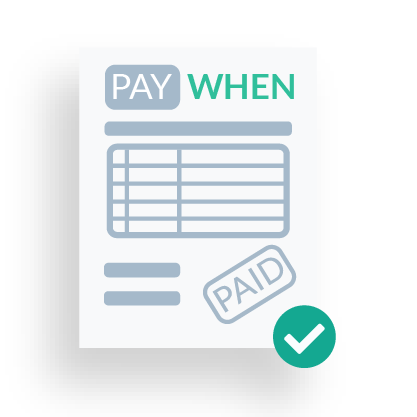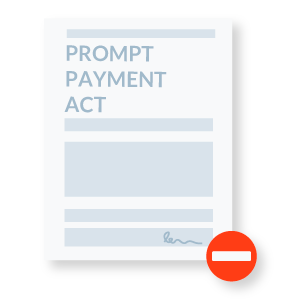Washington Construction Contracts
- Private Jobs
- Public Jobs
- Top Links
Lien Rights May Be Waived By Contract
There is no specific prohibition on waiving lien rights by contract in Washington.
Pay-if-Paid May Be Enforceable
Washington has yet to address the validity of pay-if-paid clauses that shift the risk of nonpayment to the sub, so it's safe to assume they are enforceable.

Pay-When-Paid Are Enforceable
Pay-when-paid clauses are enforceable in Washington and are treated as requiring payment within a reasonable time.

Payment Timing Mostly Unregulated
Washington does not have prompt payment provisions for private projects, the timing of payments will be governed by the contract.

Retainage Mostly Unregulated
Washington does not regulate retainage on private projects, the amount withheld will be governed by the contract.
Pay-if-Paid May Be Enforceable
Washington has yet to address the validity of pay-if-paid clauses that shift the risk of nonpayment to the sub, so it's safe to assume they are enforceable.

Pay-When-Paid Are Enforceable
Pay-when-paid clauses are enforceable in Washington and are treated as requiring payment within a reasonable time.

Payment Timing to Primes May Be Modified
Payments to prime contractors may be modified by contract, but all other payments down the contracting chain must be made within 10 days of receipt of payment.

Retainage May Not Be Modified By Contract
Retainage withheld on Washington public works projects is generally limited to no more than 5% of each progress payment.
- Understanding the 5 Main Construction Contract Types
- Construction Contract Documents: A Guide to Common Contract Parts
- Washington Prompt Payment Guide & FAQs
- Washington Retainage Guide & FAQs
- 50 State Guide: No-Lien Clauses
- Pay-when-Paid vs. Pay-if-Paid Clauses
- Construction Contracts- Beware of Certain Clauses
A construction contract outlines each party’s obligations, rights, and remedies on a project. But although the language in specific contract clauses is typically negotiable, Washington has certain rules that govern what the agreement must include — and what is prohibited.
Keep in mind that, while Washington’s rules for construction contract terms are written into state law, the courts determine how strictly those laws should be interpreted — and those interpretations can change.
On this page, you’ll find resources, legal information, and answers to frequently asked questions about Washington’s construction contract and payment terms requirements.
Washington construction contract provisions
While Washington generally allows construction parties to set the terms of their agreement, there are some laws that regulate specific types of contract provisions. Any contract clause that contradicts the law is invalid and unenforceable.
“No lien” clauses
Waiving the right to file a mechanics lien in Washington, also referred to as “no-lien clauses” is an enforceable provision on construction contracts. Furthermore, there is no prohibition against waiving lien rights prior to payment. Contractors should be wary of such provisions before entering into any new construction contract.
Contingent payment clauses
There are two types of contingent payment clauses: pay-if-paid and pay-when-paid.
Pay-if-paid clauses shift the burden of nonpayment to the subcontractor. In other words, such clauses create a condition precedent (payment from the owner) before the obligation to pay a subcontractor arises. Washington has no statutory provisions, nor any case law that suggests that pay-if-paid clauses are not enforceable. One court discussed pay-if-paid clauses, but ultimately declined to address the validity, as other factors made the analysis unnecessary.
On the other hand, pay-when-paid clauses have been upheld by Washington courts. These types of clauses do not eliminate the obligation to pay, but rather act as a timing mechanism requiring payment within a reasonable amount of time for the contractor to procure payment from the property owner.
Payment timing clauses
Private projects in Washington are not subject to any prompt payment laws. Thus, the timing of payments and interest penalties will be governed by the terms of the contract between the parties.
In contrast, public projects are regulated by prompt payment laws in Washington. Generally, payment to prime contractors must be made by the payment schedule provided in the contract. However, payment must be made no later than 30 days after receipt of an invoice, or receipt of goods/services; whichever is later. All other payments must be made to a party’s subcontractors and suppliers within 10 days of receipt of payment from the higher-tiered party.
Retainage limits
The amount of retainage that can be withheld on private projects in Washington is not regulated by statute. The amount that may be withheld on such projects will be dictated by the terms of the contract between the parties.
On public works projects, the general amount that may be withheld is no more than 5% of each progress payment. However, if the original contract price is less than $510K, the public entity may opt to withhold 10% of each progress payment in lieu of requiring the prime contractor to post a payment bond.
Washington construction contract requirements
Generally, Washington does not require certain provisions to be included in a construction contract, favoring the freedom of contract between the parties. One requirement, however, is contractors licensed by the Washington Dept. of Labor & Industries. Under the licensing laws, a contractor must include their name, address, and registration number in each contract, or face potential administrative fines.
In addition to a contractor’s license registration number, there is another provision that should be included in certain contracts to secure the ability to file a mechanics lien. Any original contractor on either a residential project of 4 or fewer units valued at $1K or more and commercial projects valued between $1K and $60K, must include a Model Disclosure Statement in 12pt, bold font.

